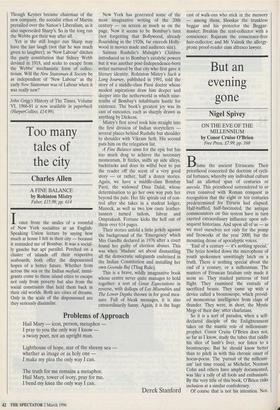Too many tales of the city
Charles Allen
A FINE BALANCE by Rohinton Mistry Faber, £15.99, pp. 614 Ionce froze the smiles of a roomful of New York socialites at an English- Speaking Union lecture by saying how much at home I felt in their city — because it reminded me of Bombay. It was a social- ly gauche but apt parallel. Perched on a cluster of islands off their respective seaboards, both offer the dispossessed hopes of a better future. Whether from across the sea or the Indian mofusil, immi- grants come to these island cities to escape not only from poverty but also from the social constraints that held them back in their old worlds. Both are cities of dreams. Only in the scale of the dispossessed are they seriously dissimilar. New York has generated some of the most imaginative writing of the 20th century — on screen as much as on the page. Now it seems to be Bombay's turn (not forgetting that Bollywood, already flourishing in the 1920s, far exceeds Holly- wood in movies made and audience size).
Salman Rushdie's Midnight's Children introduced us to Bombay's catalytic powers but it was another post-Independence-born writer nurtured by that city who first gave it literary identity. Rohinton Mistry's Such a Long Journey, published in 1991, told the story of a middle-class Parsi doctor whose modest aspirations draw him deeper and deeper into the netherworld in which nine- tenths of Bombay's inhabitants hustle for existence. The book's greatest joy was its cast of outcastes, each as sharply drawn as anything by Dickens.
Mistry's first novel took him straight into the first division of Indian storytellers several places behind Rushdie but shoulder to shoulder with Vikram Seth. His second puts him on the relegation list.
A Fine Balance aims for the epic but has too much drag to achieve the necessary momentum. It fizzles, sniffs up side alleys, backtracks and does its wilful best to put the reader off the scent of a very good story — or rather, half a dozen stories. Again, we have a middle-class Bombay Parsi, the widowed Dina Dalal, whose determination to go her own way puts her beyond the pale. Her life spirals out of con- trol after she takes in a student lodger, Maneck, as well as two low caste leather- tanners turned tailors, Ishvar and Omprakash. Fortune kicks the hell out of them over 614 pages.
Their stories unfold a little jerkily against the background of the 'Emergency' which Mrs Gandhi declared in 1976 after a court found her guilty of election abuses. This was when 'Madam' set about dismantling all the democratic safeguards enshrined in the Indian Constitution and installing her own Goonda Raj (Thug Rule).
This is a brave, wildly imaginative book whose centre never quite manages to hold together: a sort of Great Expectations in reverse, with dollops of Les Miserables and The Lower Depths thrown in for good mea- sure. Full of bleak messages, it is also extraordinarily funny. Again, it is the huge cast of walk-ons who stick in the memory — among them, Shankar the trunkless beggar and his protector the Beggar- master; Ibrahim the rent-collector with a conscience; Rajaram the conscience-free hair-collector; and Mr Valmik the allergy- prone proof-reader cum alfresco lawyer.


































































 Previous page
Previous page